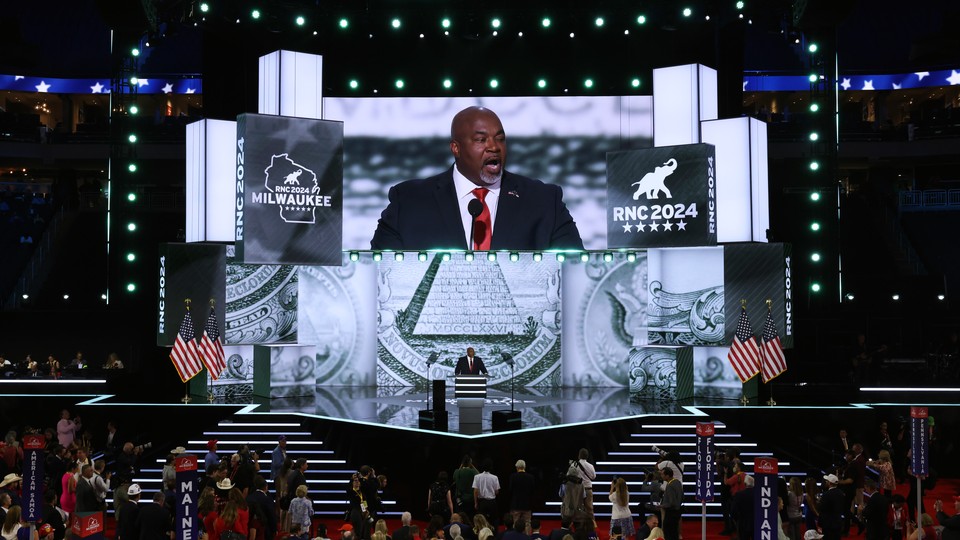The MAGA Scramble to Defend Mark Robinson
6 min read
This is an edition of The Atlantic Daily, a newsletter that guides you through the biggest stories of the day, helps you discover new ideas, and recommends the best in culture. Sign up for it here.
Mark Robinson is pointing a finger at artificial intelligence amid the recent revelations about disturbing comments he allegedly made on a porn site. Robinson, the lieutenant governor of North Carolina who is now the GOP’s gubernatorial nominee, suggested that the comments in which he apparently called himself a “black NAZI,” yearned for the restoration of slavery, and enjoyed reading Mein Kampf could have been artificially generated.
“Look, I’m not going to get into the minutiae about how somebody manufactured these salacious tabloid lies,” Robinson told CNN’s Andrew Kaczynski, who broke the original story. “But I can tell you this: There’s been over $1 million spent on me through AI by a billionaire’s son who’s bound and determined to destroy me. The things that people can do with the internet now is incredible,” Robinson insisted. “But what I can tell you is this: Again, these are not my words.”
Robinson’s claims of fakery—AI or otherwise—are extremely unlikely. As The Washington Post’s Philip Bump notes, the CNN report linking Robinson to the porn site known as “Nude Africa” was “robust,” exposing “a digital trail that would be all but impossible to create artificially.” And not everyone in the GOP is buying Robinson’s excuse. Much of his senior staff has resigned, and the Trump campaign is reportedly distancing itself from Robinson, although Donald Trump’s endorsement of Robinson still stands.
But the existence of AI aids Robinson in his shoddy defense: Not only can the technology make fake stories believable, but its existence helps those who want to make true stories seem unbelievable. In this election, invoking AI is yet another tool for some Americans to alter facts so that they align with their desired reality. Trump, for example, falsely accused Kamala Harris of using AI to generate an image showing a large crowd at a rally. (Meanwhile, he himself has spread illusions online: He recently reposted a doctored photo of Harris with the accused sex offender Sean “Diddy” Combs—whose face is actually superimposed on the body of Montel Williams; Trump also shared a fake endorsement from Taylor Swift last month.) To be sure, many fake images of politicians—including Donald Trump—proliferate online, some of which use AI, but because this technology sows doubt about reality, it can also provide a convenient dodge for politicians confronted by uncomfortable facts.
Insinuating that AI played a role is just one of the tactics that Robinson and his defenders are using. Others have argued that the allegations are a targeted political attack without identifying exactly how such supposed lies were created. The GOP’s candidate for North Carolina attorney general, Dan Bishop, called the CNN report “a meticulously timed and coordinated character assassination.” The North Carolina Republican Party released a statement hours after the report was published, citing Robinson’s denial and accused “the Left” of “trying to demonize him via personal attacks.”
Others are using vague language to avoid taking a stand. Consider, for example, this tangled double negative from J. D. Vance when he was asked about Robinson’s denial: “I don’t not believe him; I don’t believe him—I just think you have to let these things play out sometimes in the court of public opinion.” Lindsey Graham also toed a careful line, although with clearer language. “The charges are beyond unnerving. If they’re true, he’s unfit to serve for office,” Graham said. But he seemed to leave the door open to the possibility that the story was false. “If they’re not true,” Graham said, “he has the best lawsuit in the history of the country, for libel.”
Then there are those who simply don’t care about the allegations. At a Trump rally in North Carolina over the weekend,The New York Times found that while few in attendance believed the story—many blamed the untrustworthiness of the media, according to the Times—some would support Robinson even if the reports of his racist, anti-Semitic, transphobic, and obscene posts were real. “Bryan Faulcon, 39, of Wilmington, said he didn’t believe the allegations,” the Times reported, “but even if they were true, Mr. Robinson still had his vote. The calculation was simple, Mr. Faulcon said: policy over character.”
Indeed, if these allegations mattered to voters, they would not have nominated Robinson in the first place, would they? This is, after all, someone who called the Holocaust “a bunch of hogwash,” referred to transgenderism and homosexuality as “filth,” and suggested this summer that “some folks need killing.” North Carolina’s GOP voters had ample evidence of who he was, and they chose him anyway. While some of the MAGA faithful have grabbed onto convenient manipulations of the evidence in front of them, these voters’ approach seems to be acceptance.
Related:
- Mark Robinson’s dereliction of duty.
- David A. Graham: The GOP should’ve drawn its Mark Robinson line long ago.
Here are four new stories from The Atlantic.
- The anti-Semitic revolution on the American right
- Gaza’s suffering is unprecedented.
- Lighthouse parents have more confident kids.
- Vann R. Newkirk II: Why the EPA backed down
Today’s News
- Today was the deadliest day of Israeli attacks in Lebanon since at least 2006. Israeli air strikes killed hundreds of people and injured more than 1,000, according to Lebanon’s health ministry.
- A Nebraska state senator said that he would not stand behind an effort, supported by Trump and Republican allies, to change a 30-year Nebraska law that would alter the counting of electoral votes. Without him, the rule change is unlikely to pass.
- Assistant U.S. Attorney Mark Dispoto said that the Justice Department has probable cause to charge the man accused of hiding with a gun at Donald Trump’s golf course in Florida with attempted assassination of a major-party political candidate.
Evening Read

Legalizing Sports Gambling Was a Huge Mistake
By Charles Fain Lehman
Over the weekend, millions of Americans watched football. They cheered, they ate, and—more than ever—they gambled. The American Gaming Association expects $35 billion in bets to be placed on NFL games in 2024, about one-third more than last year’s total.
If you follow sports, gambling is everywhere. Ads for it are all over broadcasts; more than one in three Americans now bets on sports, according to a Seton Hall poll … Readers may be quick to dismiss these developments as harmless. Many sports fans enjoy betting on the game, they say. Is it such a big deal if they do it with a company rather than their friends?
A growing body of social-science literature suggests that, yes, this is in fact quite different. The rise of sports gambling has caused a wave of financial and familial misery, one that falls disproportionately on the most economically precarious households. Six years into the experiment, the evidence is convincing: Legalizing sports gambling was a huge mistake.
Read the full article.
More From The Atlantic
- The “law of the land” has been replaced.
- Gal Beckerman: Let us now praise undecided voters.
- Iran’s Russia problem
- How to save outdoor recess
Culture Break

Read. Virginie Despentes’s novels brim with violence against abusive men. But in her latest, Dear Dickhead, the French feminist suggests that the internet might still be a source of hope and connection, Marc Weingarten writes.
Watch. Feel that chill in the air? It’s time to settle in with our list of 25 feel-good movies you’ll want to watch again and again.
Play our daily crossword.
Isabel Fattal contributed to this newsletter.
When you buy a book using a link in this newsletter, we receive a commission. Thank you for supporting The Atlantic.



